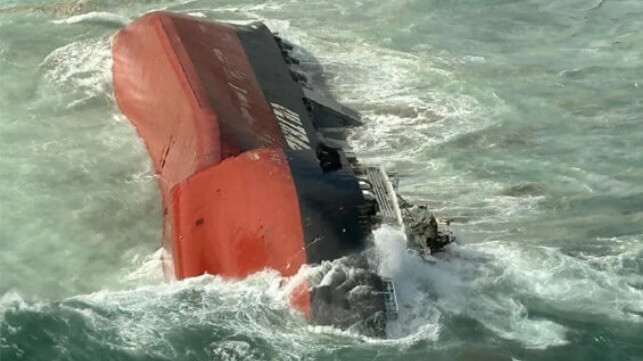Bad Weather Hampers Clean-Up and Salvage Efforts on South African Beach

Officials provided an update on the clean-up and salvage efforts for the cargo ship Ultra Galaxy (13,800 dwt) that grounded and later broke up on a remote part of the South African coast north of Cape Town. Teams are continuing to struggle with difficult weather conditions which broke the vessel and are hampering efforts to retrieve the oil that remains onboard.
“It is not called the Cape of Storms for no reason,” Richard Robertson, general manager of Smit Salvage told reporters at a briefing on the coast. He said in 10 days of operation they have only had one “really calm” day. After the briefing, the coast was battered yet again by another winter storm over the weekend.
The focus of the operation remains on locating and removing oil that remains aboard the Ultra Galaxy. The first of the series of winter storms hit the vessel with tremendous force said Robertson reporting at its peak waves were at 22 feet hitting the vessel at 15-second intervals.
The Ultra Galaxy, which was a 124.56-meter-long (409 feet) general cargo vessel, built in 2008, broke into two ahead of Frame 35 reports Robertson. The deckhouse with the accommodations was entirely ripped from the vessel. Surveys of the hull show additional stress fractures in several places.
The vessel had a total of approximately 500 tonnes of fuel aboard when it grounded, including 320 tonnes of low sulfur and 120 marine gas oil. Salvage team members are being airlifted onto the wreck by helicopters, a challenge on its own as the vessel lies at a 115-degree angle with safety lines strung for the team. They are drilling into the tanks to locate the oil and determine how much remains aboard.
Fuel tank 2 they determined has breached and tank 1 has also leaked a substantial amount. The diesel fuel tank which had 35 tonnes appears so far largely intact. Before the storms, helicopters had been able to airlift off the vessel eight tonnes of lubricating oil. Smit has also positioned a platform vessel with equipment that was to be used to pump the fuel off the vessel. Robertson said once the fuel is located it will take 48 hours of heating before it can be extracted from the tanks.
More than 200 residents from the area are working with the team on cleaning the shoreline. Officials reported that more than 200 tonnes of debris including oil as well as the bags that held the fertilizer cargo have been collected on the beach. The vessel’s hatch covers also washed ashore during the storms.
The focus of the operation remains on removing the oil and other pollutants and cleaning the beaches. Once the vessel has been cleaned and stabilized, a wreck removal contract will be awarded.
No comments:
Post a Comment